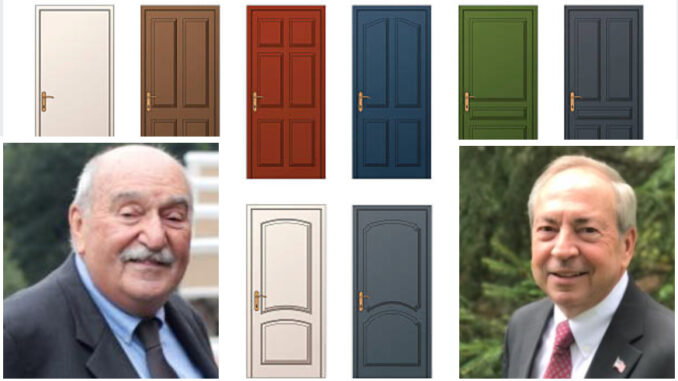
TOWNSHIP OF WASHINGTON—One councilman voted against an ordinance that mandates visible house numbers, saying he opposed it over freedom concerns.
Ordinance 22-05, requiring visible house and building numbers “to be affixed to all such structures” in the township, was championed by member Tom Sears in memory of his colleague Arthur Cumming, a longtime fire department volunteer, who had pulled together information on why mandating visible house numbers could expedite emergency services response to local homes and businesses.
The ordinance was approved, 3–1, at the March 7 council meeting. It was intended to honor Cumming on the first anniversary of his passing. (See “Address visibility push honors the late Art Cumming,” Pascack Press, Feb. 12, 2022.)
The ordinance mandates house numbers a minimum 3.5 inches in height, be of contrasting color, and “be readily visible from the street” in daylight or when a light is shone upon it.
If entry shall be gained via a sidewalk, alley, walkway or driveway, numbers shall be posted on such entries, “so as to be easily seen” from that location. The ordinance takes effect 90 days after passage and publication.
Under Failure to Comply, should the owner, occupant or lessee of any building “fail, refuse or neglect to post the number as required,” the chief construction official will offer two warnings, one via a doorway post and one via U.S. Mail, and give the owner 15 days to comply.
Owners not in compliance within 15 days are subject to a summons to appear in Municipal Court for violation of borough code. A minimum penalty not exceeding $100 can be imposed for a first violation.
For a second violation within a year the court may impose a fine above the minimum fine ($100) but below the maximum fine ($1,250).
A similar ordinance in effect in Fair Lawn since 2019 calls for 3.5-inch-high numbers.
Aiming to save lives
At the measure’s introduction, Sears, a longtime volunteer firefighter, said, “You know how many times we have responded to a fire call, and sometimes the police get there before us, and I see them walking up and down the street trying to find the number.”
Sears — a Planning Board member and previous councilman who returned to the dais to fill out Cumming’s unexpired term, before taking on a new full term in the recent council reorganization — presented Poller with sample ordinances that Cumming had compiled. He asked Poller to provide a draft that included specifics mentioned by council.
Sears said after looking at other towns’ ordinances, “We can come up with a clear, nice path for our community without burdening the community.”
Council Vice President Stacey Feeney said she was “glad we’re going to be moving this forward.” New councilwoman Daisy Velez called the improved numbering rules “a great idea.”
At the hearing and vote for adoption, Sears, Council vice president Stacey Feeney, and Daisy Velez voted yes.
Council president Desserie Morgan was absent.
Steven Cascio, a chiropractor, voted no without comment. We reached out to Cascio after the meeting for his reason to vote no. He gave several:

“Most houses already have [numbers] anyway, so it’s basically a nuisance ordinance,” he said.
He said, “Some people don’t want to be known where they live. They want a little freedom. ‘Sir, I want to remain anonymous!’”
And, he said, “That ordinance was designed, or put up, by Mr. Cumming for a different town. Fair Lawn is not Washington Township: They have a weird address system. Look in the phone book for Fair Lawn addresses. They have weird numbers.”
In fact, Fair Lawn uses a rare street address numbering system in which most addresses are given hyphenated numbers locating the property relative to blocks from the town’s Broadway, and up and down by numbered street — for example, the public library, at 10-01 Fair Lawn Ave.
Cascio said, “What about those people who have their mailboxes with their address on them already? Now you’re going to force them to put their address onto their houses?”
He said, “So now I’ve got to go out and buy some numbers and put them on my house. What if I don’t want them on my house? It’s really a liberty thing. You can’t legislate everything.”
He asked rhetorically, “Now, is it for the public good? It could be but I don’t think they ever had a problem with that in the township.”
He said, “It’s just a freedom thing. You’re taking liberties away from people. If I’m paying $20,000 in tax I should be able to put up what I want where I want on my property.”
— With some reporting by John Snyder
